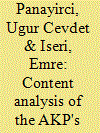|
|
|
Sort Order |
|
|
|
Items / Page
|
|
|
|
|
|
|
| Srl | Item |
| 1 |
ID:
129560


|
|
|
|
|
| Publication |
2014.
|
| Summary/Abstract |
This article examines political leaders' framing strategies during times of public diplomacy crisis. By focusing on the nexus of domestic-international politics, it argues that during public diplomacy crises, policy-makers would like to utilize their speech acts on foreign policy issues to manage expectations of domestic public opinion. This paper's main contention is to demonstrate that the head of AKP (Adalet ve Kalk?nma Partisi) government, Recep Tayyip Erdo?an, has instrumentalized his foreign policy speeches with the label of "honorable" to legitimize AKP's practices at the domestic level.
|
|
|
|
|
|
|
|
|
|
|
|
|
|
|
|
| 2 |
ID:
149432


|
|
|
|
|
| Summary/Abstract |
This paper aims to contribute to the growing Foreign Policy Analysis literature by focusing on the role of non-state actors in foreign policy implementation. Special attention is paid to the case of Turkey, which has emerged as a ‘humanitarian state’ in the last decade. In Turkey, relatively new Islamically oriented humanitarian NGOs (HNGOs) have been providing ever-increasing amounts of humanitarian aid throughout the former Ottoman lands including the Middle East and Africa. Employing a constructivist-realist perspective, this paper asserts that a ‘parallelism,’ if not a complementarity, exists between Turkey’s Islamically oriented HNGO discourse and practice and AKP foreign policy implementation process. Based on primary qualitative data acquired from interviews, this study has identified various degrees of parallelism between the two, calling into question the status of these HNGOs as purportedly non-governmental entities.
|
|
|
|
|
|
|
|
|
|
|
|
|
|
|
|
| 3 |
ID:
105389


|
|
|
|
|
| Publication |
2011.
|
| Summary/Abstract |
A panoramic outlook on the present global system shows that the US has been failing to preserve its global preponderance against the rise of new contenders from Asia. Turkey's new foreign policy demeanor under the AKP government reflects this shift of global power from the West to the East, leaning on both of these two poles (especially Russia and the US), thereby, aims at creating a 'zero-problem' situation with the neighboring Caucasian states. Yet, this strategy has not achieved its goal, mainly due to the ongoing debates, not only between Moscow and Washington, but also between Azerbaijan and Armenia in the Caucasian Regional Security Complexity. This work tries to read all these developments by applying insights from the neoclassical realist standing and argues that there are two main hindrances to the plan's success: the dynamics of the current global system and the security complexity of the Caucasus region.
|
|
|
|
|
|
|
|
|
|
|
|
|
|
|
|
| 4 |
ID:
104895


|
|
|
|
|
| Publication |
2011.
|
| Summary/Abstract |
Implementing sustainable development policies in order to achieve economic and social development while maintaining adequate environmental protection to minimize the damage inflicted by the constantly increasing world population must be a major priority in the 21st century. While the emerging global debate on potential cost-effective responses has produced potential solutions such as cap and trade systems and/or carbon taxes as part of evolving sustainable energy/environmental policies, this kind of intellectual inquiry does not seem to be an issue among Turkish policy-making elites. This is mainly due to their miscalculation that pursuing sustainable energy policies is much more expensive in comparison to the utilization of fossil fuels such as natural gas. Nevertheless, the pegged prices of an energy sector dominated by natural gas are illusive, as both the political risks and environmental damage have not been incorporated into the current cost calculations. This paper evaluates energy policies through a lens of risk management and takes an alternative approach to calculating energy costs by factoring in political risks. This formulation reveals that the cost of traditional fossil-based energy is in fact more expensive than renewable energy. In addition to being environmentally friendly, the paradigm shift towards renewable energy policies would provide Turkey with a significant opportunity to stimulate its economy by being one of the first countries to develop green technologies and as a result this burgeoning sector would prompt job creation as well; mainly due to the externalities.
|
|
|
|
|
|
|
|
|
|
|
|
|
|
|
|
| 5 |
ID:
087522


|
|
|
|
|
| Publication |
2009.
|
| Summary/Abstract |
From an offensive realist theoretical approach, this paper assumes that great powers are always looking for opportunities to attain more power in order to feel more secure. This outlook has led me to assert that the main objective of the US grand strategy in the twenty-first century is primacy or global hegemony. I have considered the US grand strategy as a combination of wartime and peacetime strategies and argued that the Caspian region and its hinterland, where I call the Eurasian Heartland, to use the term of Sir Halford Mackinder, has several geo-strategic dimensions beyond its wide-rich non-OPEC untapped hydro-carbon reserves, particularly in Kazakhstan. For my purposes, I have relied on both wartime strategy (US-led Iraq war) and peacetime strategy of supporting costly Baku-Tbilis-Ceyhan (BTC) to integrate regional untapped oil reserves, in particular Kazakh, into the US-controlled energy market to a great extent. This pipeline's contribution to the US grand strategy is assessed in relation to potential Eurasian challengers, Russia and China. The article concludes with an evaluation of the prospects of the US grand strategy in the twenty-first century.
|
|
|
|
|
|
|
|
|
|
|
|
|
|
|
|
|
|
|
|
|